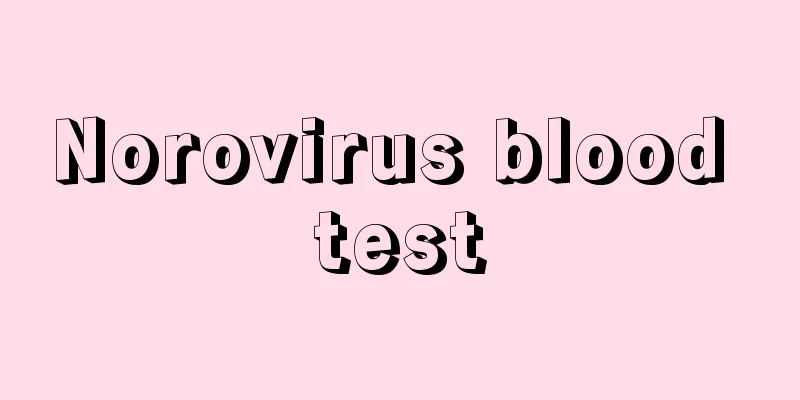Norovirus blood test

|
Norovirus is a virus that is distributed throughout the world. Once a person is infected with the norovirus, diarrhea will occur. Severe infection can even be life-threatening. Moreover, in modern clinical medicine, a vaccine for norovirus has not been developed, so if you want to prevent norovirus, you can only do so through personal hygiene and eating habits. If your body shows signs of Norovirus infection, you should go to the hospital for examination in time. What should the situation be like after a routine blood test for Norovirus? Norovirus can be diagnosed through case diagnosis The diagnosis is mainly based on epidemiological data such as epidemic season, region, age of onset, clinical manifestations and routine laboratory test results. In a diarrhea epidemic, those who meet the following criteria can be preliminarily diagnosed with norovirus infection: (1) Incubation period: 24 to 48 hours; (2) More than 50% of cases experience vomiting; (3) Disease duration 12 to 60 hours; (4) No special findings were found in stool and blood routine examinations; (5) Eliminate common bacteria, parasites and other pathogenic infections. Norovirus can be detected by laboratory General laboratory examinations showed no abnormalities and no pathogenic bacteria grew in the culture. However, viral particles can be seen in stool immunoelectron microscopy 24-48 hours after onset of the disease. How is Norevirus Infection Diagnosed? In addition to meeting the clinical diagnosis case conditions, if there are symptoms such as fever, nausea, vomiting, diarrhea, cramping abdominal pain, etc., and secondly, if Norovirus is detected in stool specimens or vomitus, then Norovirus infection can be confirmed and professional treatment is required. How to care for Norovirus 1. Oral rehydration salts Children with mild symptoms should take oral rehydration salts recommended by WHO. Severe cases, especially those in young children and the weak, should be given timely infusions to correct imbalances in water, electrolytes, and acid-base levels. 2. Daily care Attention should be paid to the patient's dietary hygiene. The patient should eat more fresh, easily digestible foods high in calcium, drink more water, eat less high-fat foods, eat less cold food. At the same time, attention should be paid to keeping the children warm and avoid going to public places where there are too many people. 3. Prevent dehydration Although most cases of this disease can recover on their own, doctors remind that dehydration is the main cause of death from Norovirus-induced diarrhea. Severe cases, especially young children and the weak, should be given timely infusion or oral rehydration to correct dehydration, acidosis and electrolyte imbalance. 4. Nutritional therapy The principle of nutritional treatment for diarrhea is to adjust the diet, stop eating high-fat and difficult-to-digest foods to reduce the gastrointestinal burden, gradually restore digestive function, supplement vitamins and electrolytes for causal treatment, and avoid the abuse of antibiotics. |
>>: Respiratory alkali poisoning blood gas analysis
Recommend
Redness after the abrasion scab falls off
People will inevitably encounter some bumps and b...
Tips for boiling chestnuts
Sugar-roasted chestnuts are a very common snack i...
What are the wonderful uses of Polygonum multiflorum
Polygonum multiflorum is a slender herb that is p...
Advantages of Chinese medicine in assisting the treatment of breast cancer
Breast cancer is mainly treated with surgery, rad...
How to clean dental tartar yourself
Teeth can develop various diseases, including tar...
What are the early symptoms of nasopharyngeal carcinoma and how to treat it
What are the early symptoms of nasopharyngeal car...
ERCP effect of common bile duct stones
Everyone should have heard of gallstones. If gall...
What should you pay attention to when you have angina pectoris?
Generally, after an angina attack, the patient fe...
What are the typical symptoms of ovarian tumors
Typical symptoms of ovarian tumors include abdomi...
What should I pay attention to in my diet before a physical examination
Physical examination is a regular check of people...
Several gallbladder cancer care details to pay attention to in daily life
MicrosoftInternetExplorer402DocumentNotSpecified7...
What are the liver cancer cell lines
When we talk about liver cancer, everyone will be...
Are lung cancer patients contagious? 4 pieces of information about lung cancer
In life, people avoid contact with lung cancer pa...
How to treat bone metastasis of prostate cancer
Prostate cancer bone metastasis is very serious. ...
Can sagging double eyelids be repaired?
Drooping double eyelids are very common in daily ...









